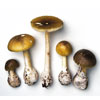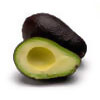|
|
 |
|
FAQ |
|
 |
Dog Food Hazards
 |
| |
|
Dogs can get sick when given foods they shouldn't have. Children are tempted to give pets food, such as chocolate and other sweets. Pet owners should be aware of what their pets consume. Avoid giving pets the following foods:
|
 |
|
|
Chocolate & Caffeine
|
|
Chocolate contains theobromine, a compound that is a cardiac stimulant and diuretic.
When a pet has eaten a large quantity of chocolate, many pet owners assume their pet is unaffected. However, the signs of sickness may not be seen for several hours, with death following within 24 hours.
Symptoms include staggering, labored breathing, vomiting, diarrhea, abdominal pain, tremors, fever, heart rate increase, arrhythmia, seizures, coma and death.
|
|
 |
|
|
Raw Eggs
|
|
Raw egg whites contain an enzyme called avidin that decreases the absorption of biotin (B vitamin). This can lead to skin and hair coat problems. Raw eggs may also contain Salmonella.
|
|
 |
|
|
Candy & Gum
|
|

|
Candy, gum, toothpaste, baked goods and some diet foods are sweetened with Xylitol. Xylitol can cause an increase in the insulin circulating through your dog's body, causing your dog's blood sugar to drop and lead to liver failure. Initial symptoms include vomiting, lethargy and loss of coordination. Eventually, the dog may have seizures and liver failure can occur within just a few days.
|
 |
|
|
Onions & Garlic
|
|
Onions and garlic contain the toxic ingredient thiosulphate. Onions are particularly dangerous. Pets affected by onion toxicity develop haemolytic anemia where the pet’s red blood cells burst while circulating in their body. Symptoms include Hemolytic Anemia, labored breathing, liver damage, vomiting, diarrhea and discolored urine.
Poisoning occurs a few days after the pet has eaten onions. All forms of onions can be a problem including dehydrated onions, raw onions, cooked onions and table scraps containing cooked onions and/or garlic. Leftover pizza, Chinese dishes and commercial baby food containing onions sometimes fed as a supplement to young pets, are examples. While garlic also contains the toxic ingredient thiosulphate, it seems that garlic is less toxic and large amounts would need to be eaten to cause illness.
|
|
 |
|
|
Milk
|
|

|
Some adult dogs and cats do not have sufficient amounts of the enzyme lactase which breaks down lactose in milk. This can result in diarrhea. Lactose-free milk products are available for pets.
|
 |
|
|
Grapes and Raisins
|
|
A handful of raisins or grapes can make a dog ill. Symptoms include vomiting, diarrhea, abdominal pain and lethargy. The mass consumption of grapes has been known to cause acute kidney failure and eventually death.
|
|
 |
|
|
Mushrooms
|
|

|
Mushroom toxicity can occur in dogs and can be fatal if certain species of mushrooms are eaten. Amanita phalloides is the most commonly reported toxic species of mushrooms in the US; other Amanita species are toxic as well. Symptoms include Abdominal pain, drooling, liver damage, kidney damage, vomiting diarrhea, convulsions, coma and death.
|
 |
|
|
Raw Fish & Meat
|
|
Raw meat and raw fish can contain bacteria that cause food poisoning. In addition, certain kinds of fish such as salmon, trout, shad or sturgeon can contain a parasite that causes "fish disease." If not treated, the disease can be fatal within 2 weeks. The first signs of illness are vomiting, fever and large lymph nodes. Thoroughly cooking fish will kill the parasite and protect your dog.
|
|
 |
|
|
Avocados
|
|

|
Avocados contain persin, an oily toxin that causes both cats and dogs to vomit and have diarrhea. All parts of an avocado are toxic to animals as the persin originates in the pit but the oil spreads to the fruit and skin of the food.
|
 |
|
|
Macadamia Nuts
|
|
Macadamia nuts have high phosphorus content, said to possibly lead to bladder stones. Dogs can develop a tremor of the skeletal muscles, and weakness or paralysis of the hindquarters. Affected dogs are often unable to rise and are distressed, usually panting. Some affected dogs have swollen limbs and show pain when the limbs are manipulated.
|
|
 |
|
|
Cat Food
|
| Cat food is generally too high in protein and fats for dogs. |
|
| |
|
Fat Trimmings & Bones
|
|

|
Table scraps often contain meat fat and bones a human didn't eat. Both are dangerous for dogs. Fat trimmed from meat, both cooked and uncooked, can cause pancreatitis in dogs. Although it seems natural to give a dog a bone, dogs can choke on it. Bones can also splinter and cause an obstruction or lacerations in a dog's digestive system.
|
 |
|
|
Plants
|
|
Dog owners should be wary of what plants they have around during the holidays. Many plants can be harmful to pets if digested. One of the most common plants found during the holidays is the Poinsettia. If you think your dog has digested some of the plant, a few signs to look out for include vomiting, anorexia and depression. Although symptoms can be self-limiting and treatment is rarely needed, you may want to call your vet. Your vet may recommend limiting food and water intake for 1 or 2 hours.
|

|
 |
|
|
Salt
|
|

|
It's not a good idea to share salty foods like chips or pretzels with your dog. Eating too much salt can cause excessive thirst and urination, leading to sodium ion poisoning. Symptoms of too much salt include vomiting, diarrhea, depression, tremors, elevated body temperature, seizures and even death.
|
 |
|
|
Alcohol
|
|
Beer, liquor, wine, and foods containing alcohol are not good for dogs. Alcohol has the same effect on a dog's liver and brain as it has on humans but with greater potency. Small amounts can cause vomiting, diarrhea, central nervous system depression, problems with coordination, difficulty breathing, coma and even death.
|

|
 |
|
Persimmons, Peaches, and Plums
|
|

|
The problem with these fruits is the seeds or pits. Seeds from persimmons can cause inflammation of the small intestine and cause intestinal obstruction. Obstruction is also a possibility if a dog eats the pit from a peach or plum. Peach and plum pits also contain cyanide, poisonous to both humans and dogs. The difference is that humans know not to eat them. Dogs don't.
|
|
|
|
|
|
|
|
|

